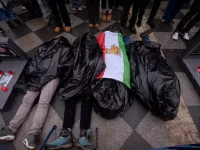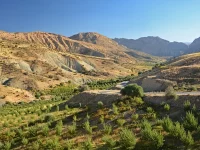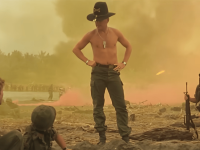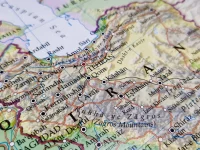Lesbos Island Drama « They hit their head against the wall »

HOT SPOT The situation in the new camp on the Greek island of Lesbos is even worse than in the first, reports child psychologist Katrin Glatz Brubakk. The psychological suffering of the children is enormous, and the evacuation is urgent.
« Many children who have not been mentally ill before will become there in the refugee camp »: Child psychologist Katrin Glatz Brubakk in a barrack of Doctors Without Borders on Lesbos.
WOZ: Ms. Glatz Brubakk, what are the children and young people suffering from in the refugee camps on Lesbos?
Katrin Glatz Brubakk: You suffer from everything that children can suffer psychologically from: nightmares, difficulty concentrating, low tolerance for frustration, aggressiveness and panic attacks. Some children withdraw almost completely from the world. They don’t play anymore, some have barely spoken a word for eight months. Others are so apathetic that they no longer have to eat and feed themselves. They are so listless that they no longer even go to the toilet themselves. Nine-year-old children sometimes have to wear diapers again during the day.
What were the consequences of the fire in the refugee camp?
Since the Moria camp burned down, there have been many sleepwalking children here. The fire woke the children up last September. Suddenly they had to run for their lives. They still dream of it today. At night they run through the camp and shout: “Help! It’s burning! I’m dying! » Since the new camp is right on the water, some parents now tie their children up at night so that they don’t run into the sea and drown. The body and mind need restful sleep in order not to get sick. But the children in the refugee camps in Lesbos do not sleep well. This is one of the reasons why some children suffer from severe depression. They injure themselves by biting themselves, pulling their hair out, or hitting their head against the wall or floor until they bleed.
Are there any children who are so desperate that they want to take their own lives?
Yes. MSF treated fifty children in 2020 for serious suicidal ideation or attempted suicide. The youngest girl was eight years old. This year we have treated three children after attempting suicide. Among them is a thirteen-year-old boy from Afghanistan who has already attempted suicide many times.
How can you help him?
We see him and his parents several times a week. If necessary, we prescribe medication and work out safety plans with the parents. We are trying to stabilize the situation – as far as possible under the conditions here – until the children can be transferred to a psychiatric clinic on mainland Greece. Proper treatment can only be provided in such a facility.
How can you help other mentally ill children?
By talking, playing and painting with them. While playing, the children can relax at least for a short time. This reduces the level of stress hormones in the body. This enables children to concentrate and learn again. We talk a lot with the older children in order to bring back good, but buried memories. Many children keep painting schools because they finally want to go back to school. A seven-year-old boy from Syria is constantly painting his green bicycle, which was destroyed in the bombing of his parents’ home. He would love to ride his bike again. When children run out of dreams, desires, and plans, they see no reason to get up in the morning and move on. We have to prevent that.
Can parents help their mentally ill children?
There are many parents in the camp who I admire for the way they give their children the best possible security despite the adverse circumstances. But the resilience of these parents will also be used up at some point. In addition, there are many children in the camp who have fled alone or no longer have parents.
Many children were traumatized even before Moria.
Many who have not been mentally ill before will be here. Most children, however, are already traumatized by what they experienced in their home country or when they were on the run. They have seen family members starve to death or beheaded before their very eyes. Many have seen relatives drown when the completely overloaded rubber dinghies sank between Turkey and Greece. Especially girls who fled alone were often raped several times and had to pay with their bodies for an overnight stay or the next part of the escape.
Are there any chances of recovery for mentally ill children in the camp?
Here we can only try to keep them alive. We just put a plaster on the burn while people are still standing in the fire.
Katrin Glatz Brubakk.










